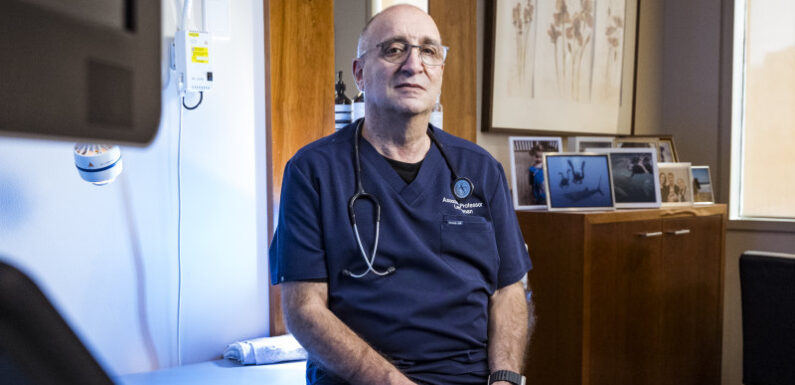
Save articles for later
Add articles to your saved list and come back to them any time.
Doctors are treating a growing number of women with recurrent thrush – including cases that are resistant to treatment – and believe stress and the overuse of medications is fuelling the rise.
East Melbourne gynaecologist Dr Len Kliman is seeing up to 40 women a month who have chronic vaginal thrush that is not responding to traditional antifungal treatments. He rarely encountered these patients just three years ago.
Dr Len Kliman has been a gynaecologist for more than 30 years. He’s concerned about a rise in recurrent thrush that is resistant to treatment.Credit: Chris Hopkins
“In the past, if you had thrush, you would go to the chemist and they would give you a cream and you’re cured,” Kliman said. “That’s no longer the case.”
About 75 per cent of women will experience thrush at some point in their lives. The infection is characterised by itching, burning and a thick discharge. Recurrent thrush is defined as having four or more bouts of thrush in a year.
Kliman said the infection, which is caused by an overgrowth of the yeast, Candida, caused discomfort and embarrassment.
“It’s distressing to keep on getting an irritating infection that doesn’t respond to treatment. They can’t sit properly, they can’t ride a bike, they can’t have intercourse comfortably. It has a real impact on their quality of life.”
Kliman suspects the overuse of antifungal medications, including fluconazole, has led to thrush becoming resistant to this treatment. He said women were being incorrectly advised to use these medications for eczema or dermatitis.
“I think the more [the yeast] gets exposed to antifungals, the more it modifies itself to get around what we are doing to try and kill it.”
Kliman said one of his patients with recurrent, drug-resistant thrush had relocated to the United States to take part in a clinical trial for a new drug.
Dr Ross Pagano, who heads the Vulvar Disorders Clinic at Melbourne’s Royal Women’s Hospital, has also seen a rise in recurrent thrush. He treats about 25 patients with this condition every month and believes their infections are linked to the long-term use of antibiotics – which kill off beneficial bacteria that curbs the growth of yeast – and stress.
Research has found that stress impairs our immune system’s ability to control yeast. Studies have also found that yeast thrives on the additional sugars released into our blood when we are stressed.
“One of the commonest features I see in younger women with chronic thrush is that they are under a lot of stress … when you’re stressed, things like Candida infection can really go berserk,” Pagano said.
He said new medications for type 2 diabetes, which help to manage the disease and reduce the risk of heart failure, could also exacerbate thrush in older women.
“They cause the kidney to release urine with a high concentration of sugar and it then dries on the vulva and they get this chronic thrush,” he said.
He advises patients with recurrent thrush to wear loose clothing and swap synthetic underwear for cotton.
“Anything that causes a lot of sweating in the area is going to promote things like thrush,” he explained.
He also encourages patients to wash their underwear in pure soap and steer clear of detergents, which can irritate the skin.
Pagano has treated women with strains of thrush that are resistant to fluconazole, but said they had responded well to other expensive medication.
Royal Women’s Hospital nurse practitioner Dr Cathy Watson, who completed her PhD on thrush, said while the condition cleared up overnight for some women without treatment, others required antifungal treatment, including topical creams or oral tablets.
She said there was not a lot of strong evidence supporting non-conventional treatments such as yoghurt or probiotics. “But if someone swears something works for them, then I don’t dispute it,” she added.
Watson said some women battled recurrent thrush infections for years.
“Their suffering can be so profound,” she said. “It’s not talked about at dinner parties. It is a very difficult condition to manage.”
Fascinating answers to perplexing questions delivered to your inbox every week. Sign up to get our Explainer newsletter here.
Most Viewed in National
From our partners
Source: Read Full Article
